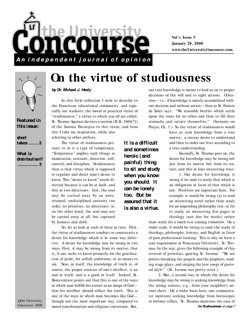Rights of workers: an under-appreciated part of Catholic social teaching
by John F. Cavanaugh O'Keefe
In the discussion of fair labor practices initiated by Regina Schmiedicke (V,1), Kevin Schmiesing notes, “There are considerable practical difficulties with the notion of the family wage, the most important being the establishment of exactly what level of wage is ‘just’” (V,2). That is true, and is one reason why I am so proud to be a Catholic, with a rich tradition exploring this question.
Pope Leo XIII wrote about labor in 1891, and since then others Popes have returned to the matter repeatedly, notably in encyclicals that are named in reference to Pope Leo’s great work: Quadragesimo Anno (40 years after Pope Leo’s encyclical), Octogesimo Anno (80 years after) and Centesimus Annus (the 100th year after). Despite the admitted difficulties, the Holy See defended the notion of a family wage in the 1983 “Charter of the Rights of the Family.”
One of the great tragedies of our time is that so many Catholics are aware of only half of the Church’s teaching on how to live our lives in the modern world. Many Catholics embrace and promote the Church’s teaching on sexual morality; others are especially concerned with the Church’s teaching on matters of justice, including labor. Unfortunately, few Catholics are equally committed to both aspects of the Church’s great wisdom.
It goes so far that factions are formed within the Church. These factions rarely speak to each other, and even frequently denounce each other for hypocrisy. Thus it can and does happen that organizations that bill themselves as “pro-family” show themselves hostile to concern for the rights of wage earners. But the teaching of the Church is clear: family life is gravely threatened by sexual misconduct, and family life is gravely threatened when society is careless about the rights of workers. Schmiesing asks, “Does Catholic social teaching insist that every parent, upon the birth of a child, be guaranteed an increase in salary?” Perhaps not in so many words, but in essence the answer is yes—if the raise is necessary to meet the increased expenses involved in having another child.
The principle is stated explicitly in Quadragesimo Anno (1931):
71. In the first place, the worker must be paid a wage sufficient to support him and his family. . . It is an intolerable abuse, and to be abolished at all cost, for mothers on account of the father’s low wage to be forced to engage in gainful occupations outside the home to the neglect of their proper cares and duties, especially the training of children. Every effort must therefore be made that fathers of families receive a wage large enough to meet ordinary family needs adequately….It will not be out of place here to render merited praise to all who . . . have tried and tested various ways of adjusting the pay for work to family burdens in such a way that, as these increase, the former may be raised…
Michael Welker seems to doubt that unfair labor practices are widespread in Catholic organizations. And he noted that when there are serious labor abuses, “significant legal remedy is available,” including the specter of “bankrupting litigation” (V,2).
Indeed such remedies exist, but the people who accept the difficulties of an apostolate in the first place are usually extremely reluctant to take a charity organization to court. What Catholic wants to take another Catholic to court? Will legal proceedings damage critical pro-family work?
Some disclosure may be necessary here: Regina was referring to me and two others when she spoke of a complaint filed with the National Labor Relations Board against a pro-life charitable organization. When my fellow fired employees and I filed a complaint with the NLRB (after the local diocese told us that they had no jurisdiction in the case), we were accused of handing a club to the Clinton administration—a club that will be used against many pro-life and religious organizations. But we are convinced that the NLRB is a rational alternative to “bankrupting litigation,” and that it deserves the whole-hearted support of Catholics who understand and support the Church’s social teaching.
I’m with Regina. The teaching of the Church on family life is as balanced as an icon of the Holy Family. To protect the dignity of each individual as a child of God, we must struggle for personal morality and also for social justice. Love for the child leads us to defend motherhood as a noble vocation, and also to assert the right to wages and working conditions that take the family into account.
John Cavanaugh O’Keefe
Mr. Cavanaugh-O’Keefe is Director of Pro-Life Century, which teaches about the foundations for a renewal of the pro-life movement. He and his wife and six children live in Maryland.


